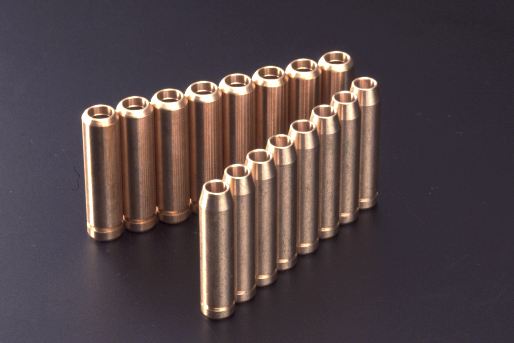4G63 バルブガイドVALVE GUIDE 4G63
4G63 バルブガイド
バルブ関連
リン青銅(Cn-Sn-P合金)は強度と熱伝導率が高いため、高回転、高出力エンジンのバルブガイドに用いられます。また、一般の材料に比べ摺動性能が高いため、バルブとのクリアランスを小さくでき、バルブ周りの組み付け、作動精度が向上できます。
これにより動弁系のストレス低下、バルブスティック防止、バルブガイド割れ防止と、絶大な効果をもたらします。
PRODUCT INFO
| 適合 | IN/EX | 品番 | 定価 |
|---|---|---|---|
| 4G63 | SET | 163301 | ¥35,500 (税込 ¥39,050) |
| IN単品 | 161302 | ¥2,300 (税込 ¥2,530) | |
| EX単品 | 161303 |
FEATURE / SPEC
| 材質MATERIAL | 5191(リン青銅2種) 5191(Cn-Sn-P alloy) |
|---|---|
| 引張り強度TENSILE STRENGTH | 590~685(N/㎜2) |
| 硬さHARDNESS | 180~230(HB) |
■直押し式よりロッカーアーム式のほうが、側圧が大きく摩耗しやすい。またその時ステムの面粗度が粗いとより進行する。
■直押しでもハイリフトカムのほうが摩耗が速い。
■カーボンの噛みこみによる摩耗。先端が少しでもひらくとファンネル効果でさらに吸い込む。
■バルブサージングでのガイド両端部変形から、カーボン噛みこみ。
■シートカット不良。これは45度面の中心とバルブガイドの中心の同芯度不良によるもの。同芯度0.01㎜以内。
■クリアランス不良。計算上シートカットの同芯度が0.01㎜ずれるだけでバルブ着座時にバルブがガイド内壁にこすれることになるので、0.03~0.04位が適切。それ以上はクリアランス過多でガイドが側圧を受けてしまい先端がひらいてカーボン噛みこみの原因となる。
■中古バルブが摩耗している。ガイド交換の際ノーマルカムリフトで摩耗しているバルブを使用し、ハイリフトカムに変更すると、ステム部で摩耗していない部分も使用することになりステムの段付部分で削れてしまう(0.01㎜位の摩耗はよくある)。
■バルブ設計不良。まれにステム真ん中(ガイドに入る部分)で鉄とステンをくっつけているバルブがあるが膨張率の違いから、かじりが発生しガイドが摩耗する。 Still since the product will be used for extreme conditions, it will still require additional regular maintenance and periodical checks. The product can wear out faster under certain conditions. Some examples of the abnormal conditions are as follows.
■The rocker arm type assemblies will apply more lateral pressure, which will increase the wear rate. If the stem wall of the valve is rough, it will also contribute to the increased wear rate.
■Using high lift, aggressive camshafts will also increase the wear rate.
■Excessive buildup of carbon will also hinder performance and increase wear rate. When there’s a small opening at the end, it will increase the carbon buildup rate as a funnel effect.
■The results from Valve Spring surging will cause the Valve to move on an angle. This will cause both ends to open up and create deformation. Then carbon can enter the valve guides more which will increase the wear rate.
■A defective seat cut. When the seat cut’s centerline across the main 45 degree face is offline from the valve stems centerline by more than 0.01mm, this can cause increased abnormal wear rate.
■If the clearance is not within the correct 0.03-0.04mm range. The Valve will rub against the guides inner wall, this degree angle in relation to the seat cut will cause it to shift by 0.01mm more than the clearance values. The guide will take the lateral pressure point and open up the opening. The buildup of carbon will increase in the newly formed gaps.
■A worn out used Valve. It’s possible to cut down by using the part that has not worn out the stem when changing to a high lift cams. The guides can wear out when the inappropriate clearances are made. (About 0.01mm out of clearance).
■The Valve design is defective. The difference from the dilatability and the guide being worn out abnormally is when the valve that is made with different alloys, will contribute with a faster deterioration.
VALVE GUIDE 4G63
VALVE TRAIN
We chose to use Phosphor Bronze (Cn-Sn-P alloy) to make our Valve Guides, for its highly tensile and superior heat transferring ability, which is vital in high power and high RPM outputting engines. Since race engines these days require more power at higher RPM use , these engines now experience more extreme heat conditions. These conditions will increase the deterioration rate on these valve train related components. The Phosphor Bronze material has exceptionally lower friction and the best possible clearances can be maintained, which will reduce the stress on the valve train assembly, prevent seizures and cracking under high stress loads.
PRODUCT INFO
| APPLICATION | IN/EX | P/N | JPY |
|---|---|---|---|
| 4G63 | SET | 163301 | ¥35,500 |
| IN | 161302 | ¥2,300 | |
| EX | 161303 |
FEATURE / SPEC
| 材質MATERIAL | 5191(リン青銅2種) 5191(Cn-Sn-P alloy) |
|---|---|
| 引張り強度TENSILE STRENGTH | 590~685(N/㎜2) |
| 硬さHARDNESS | 180~230(HB) |
■直押し式よりロッカーアーム式のほうが、側圧が大きく摩耗しやすい。またその時ステムの面粗度が粗いとより進行する。
■直押しでもハイリフトカムのほうが摩耗が速い。
■カーボンの噛みこみによる摩耗。先端が少しでもひらくとファンネル効果でさらに吸い込む。
■バルブサージングでのガイド両端部変形から、カーボン噛みこみ。
■シートカット不良。これは45度面の中心とバルブガイドの中心の同芯度不良によるもの。同芯度0.01㎜以内。
■クリアランス不良。計算上シートカットの同芯度が0.01㎜ずれるだけでバルブ着座時にバルブがガイド内壁にこすれることになるので、0.03~0.04位が適切。それ以上はクリアランス過多でガイドが側圧を受けてしまい先端がひらいてカーボン噛みこみの原因となる。
■中古バルブが摩耗している。ガイド交換の際ノーマルカムリフトで摩耗しているバルブを使用し、ハイリフトカムに変更すると、ステム部で摩耗していない部分も使用することになりステムの段付部分で削れてしまう(0.01㎜位の摩耗はよくある)。
■バルブ設計不良。まれにステム真ん中(ガイドに入る部分)で鉄とステンをくっつけているバルブがあるが膨張率の違いから、かじりが発生しガイドが摩耗する。 Still since the product will be used for extreme conditions, it will still require additional regular maintenance and periodical checks. The product can wear out faster under certain conditions. Some examples of the abnormal conditions are as follows.
■The rocker arm type assemblies will apply more lateral pressure, which will increase the wear rate. If the stem wall of the valve is rough, it will also contribute to the increased wear rate.
■Using high lift, aggressive camshafts will also increase the wear rate.
■Excessive buildup of carbon will also hinder performance and increase wear rate. When there’s a small opening at the end, it will increase the carbon buildup rate as a funnel effect.
■The results from Valve Spring surging will cause the Valve to move on an angle. This will cause both ends to open up and create deformation. Then carbon can enter the valve guides more which will increase the wear rate.
■A defective seat cut. When the seat cut’s centerline across the main 45 degree face is offline from the valve stems centerline by more than 0.01mm, this can cause increased abnormal wear rate.
■If the clearance is not within the correct 0.03-0.04mm range. The Valve will rub against the guides inner wall, this degree angle in relation to the seat cut will cause it to shift by 0.01mm more than the clearance values. The guide will take the lateral pressure point and open up the opening. The buildup of carbon will increase in the newly formed gaps.
■A worn out used Valve. It’s possible to cut down by using the part that has not worn out the stem when changing to a high lift cams. The guides can wear out when the inappropriate clearances are made. (About 0.01mm out of clearance).
■The Valve design is defective. The difference from the dilatability and the guide being worn out abnormally is when the valve that is made with different alloys, will contribute with a faster deterioration.



